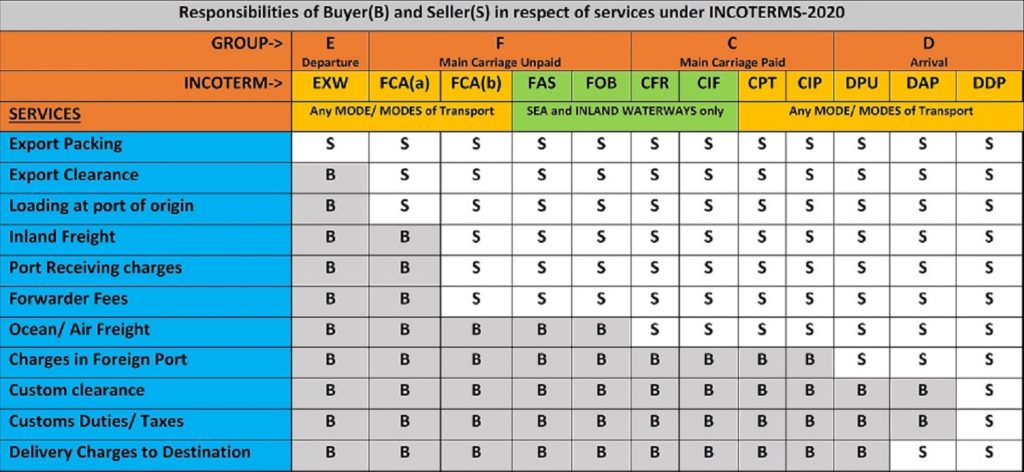INCOTERMS 2020
Every Contract placed for export or import of Goods is covered by certain conditions mentioned in the contract. One of the conditions that govern the terms of supply is the delivery term. The mode of delivery, especially when goods are traded across the border are governed by certain internationally accepted terms such as FOB, FAS, CIF and so on. What are these terms and why are they important? The details are available in INCOTERMS. INCOTERMS is an abbreviation of International Commercial terms. These terms govern the Sales and Purchase practices, and form part of any standard Contract or Supply Orders. The INCOTERMS are revised periodically and published by the International Chamber of Commerce (ICC). The first publication was in 1936, latest such revision is of January 2020. The INCOTERMS are not law, but set of standard commercial practices adhered to around the world and when form part of the supply order or a contract it becomes a binding for both the parties and become basis for arbitration in cases of disputes.
Each term in INCOTERM specifies:
The obligations for services such as transport, import and export clearance, duty, documentation cost etc. of the Supplier and the Buyer. The point of transportation from where the risk and cost transfers from the Seller to the Buyer
By understanding the INCOTERMS and properly incorporating it into the Supply Orders or Contracts, both the Seller and the Buyer will be relieved of unnecessary disputes and litigation in the event of loss, damage or other mishap to the goods from the time of supply to the receipt of the goods.
INCOTERMS can be divided in four main groups as under:
“E” – Departure
EXW – Ex Works – Named Place of Delivery
“F” – Main Carriage Unpaid
FCA – Free Carrier – Named Place of delivery
FAS – Free alongside Ship – Named Port of Shipment – OCEAN only
FOB – Free on Board – Named Port of Shipment – OCEAN only
“C” – Main Carriage Paid
CFR – Cost Freight – Named Port of destination – OCEAN only
CIF – Cost Insurance and Freight –Named Port of Destination – OCEAN only
CPT – Carriage Paid To – Named Place
CIP – Carriage Insurance Paid To – Named Place of destination
“D” – Arrival
DPU – Delivered at Place Unloaded – Named Place of Destination
DAP – Delivered at Place – Named Place of destination
DDP – Delivered duty Paid – Named Place of destination
EXW – Ex Works (Named place of delivery)
The buyer bears all costs and risks involved in taking the goods from the seller’s premises or at another named place to the desired destination. The seller’s obligation is to make the goods available at his premises or at another named place (works, factory, warehouse etc.). This term represents minimum obligation for the seller. This term can be used across all modes of transport.
FCA- Free Carrier (Named place of delivery)
FCA can have two different meanings, each with varying levels of risk and cost for the buyer and seller. FCA (a) is used when the seller delivers the goods, cleared for export, at a named place which is their own premises. FCA (b) is used when the seller delivers the goods, cleared for export, at a named place which is not their premises. In both instances, the goods can be delivered to a carrier nominated by the buyer, or to another party nominated by the buyer. This term can be used across all modes of transport.
The most significant change relates to the term Free Carrier (FCA). Under this term, the buyer can now instruct its carrier to issue a bill of lading with an on-board notation to the seller so that they may satisfy the terms of a letter of credit.
FAS – Free Alongside Ship (Named port of shipment)
The seller must place the goods alongside the ship at the named port. The seller must clear the goods for export. Suitable only for maritime transport but NOT for multimodal sea transport in containers. This term is typically used for heavy-lift or bulk cargo.
FOB – Free on Board (Named port of shipment)
The seller must load themselves the goods on board the vessel nominated by the buyer. Cost and risk are divided when the goods are actually on board of the vessel. The seller must clear the goods for export. The buyer must instruct the seller the details of the vessel and the port where the goods are to be loaded, and there is no reference to, or provision for, the use of a carrier or forwarder. FCA should be used for container shipments. The term is applicable for maritime and inland waterway transport only but NOT for multimodal sea transport in containers.
CFR – Cost and Freight (Named port of destination)
The seller must pay the costs and freight required in bringing the goods to the named port of destination. The risk of loss or damage is transferred from seller to buyer when the goods pass over the ship’s rail in the port of shipment. The seller is required to clear the goods for export. This term should only be used for sea or inland waterway transport.
CIF – Cost, Insurance and Freight (Named port of destination)
The seller has the same obligations as under CFR however he is also required to provide insurance against the buyer’s risk of loss or damage to the goods during transit. The seller is required to clear the goods for export. This term should only be used for sea or inland waterway transport.
CPT – Carriage Paid To (Named place of destination)
The seller pays the freight for the carriage of goods to the named destination. The risk of loss or damage to the goods occurring after the delivery has been made to the carrier is transferred from the seller to the buyer. This term requires the seller to clear the goods for export and can be used across all modes of transport.
CIP – Carriage and Insurance Paid to (Named place of destination)
The seller has the same obligations as under CPT but has the responsibility of obtaining insurance against the buyer’s risk of loss or damage of goods during the carriage. The seller is required to clear the goods for export and required to obtain insurance. This term requires the seller to clear the goods for export and can be used across all modes of transport. The containerized transport/ multimodal equivalent of CIF.
In INCOTERMS 2020 term CIP, the seller is now responsible for purchasing a higher level of insurance coverage—at least 110% of the value of the goods as detailed in Clause A of the Institute Cargo Clauses.
DPU – Delivered at Place Unloaded (Named place of destination)
Previously named Delivered at Terminal (DAT), this Incoterm has been renamed Delivered at Place Unloaded (DPU) under INCOTERMS 2020, because the buyer and/or seller may want the delivery of goods to occur somewhere other than a terminal.
This term is often used for consolidated containers with multiple consignees, and it is the only term that tasks the seller with unloading the goods. Seller clears the goods for export and bears all risks and costs associated with delivering the goods and unloading them at the terminal at the named port or place of destination. Buyer is responsible for all costs and risks from this point forward including clearing the goods for import at the named country of destination.
This term is similar to DAP. However, when DPU is used, the seller must also ensure that the cargo is properly unloaded at the place of delivery. This rule is suitable when the cargo is of a nature that requires special handling for unloading that the seller is better equipped to manage.
DAP – Delivered at Place (Named place of destination)
Seller clears the goods for export and bears all risks and costs associated with delivering the goods to the named place of destination not unloaded. DAP means the buyer is responsible for all costs and risks associated with unloading the goods and clearing customs to import the goods into the named country of destination.
DDP – Delivered Duty Paid (Named place of destination)
Seller is responsible for delivering the goods to the named place in the country of the buyer, and pays all costs in bringing the goods to the destination including import duties and taxes. The seller is not responsible for unloading. This term is often used in place of the non-Incoterm “Free in Store (FIS)”. This term places the maximum obligations on the seller and minimum obligations on the buyer.
Responsibilities of Buyer and Seller in respect of various services under INCOTERMS, explained in Tabular form:

